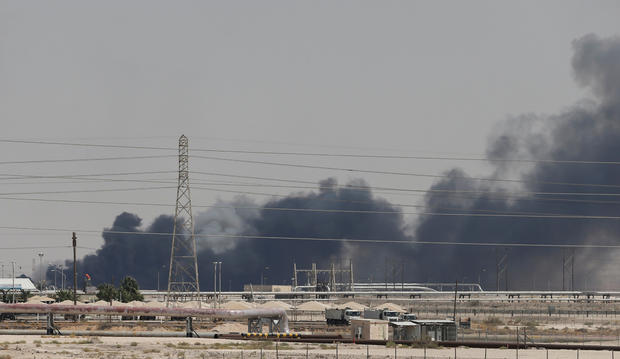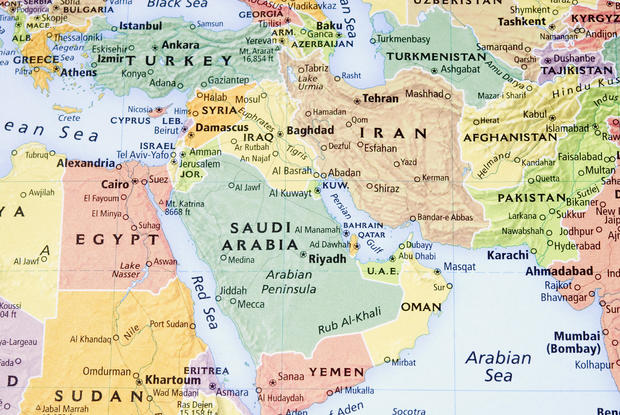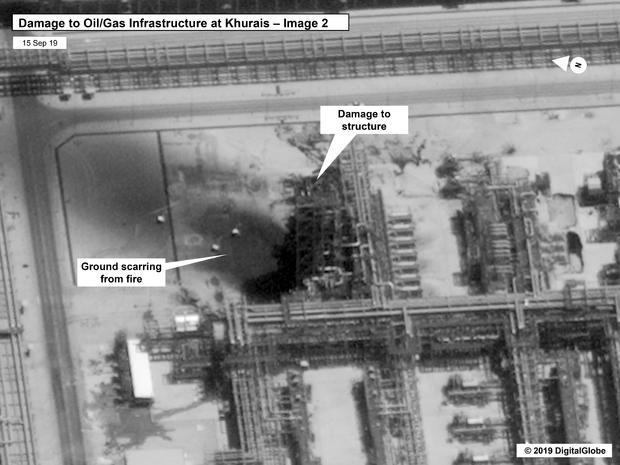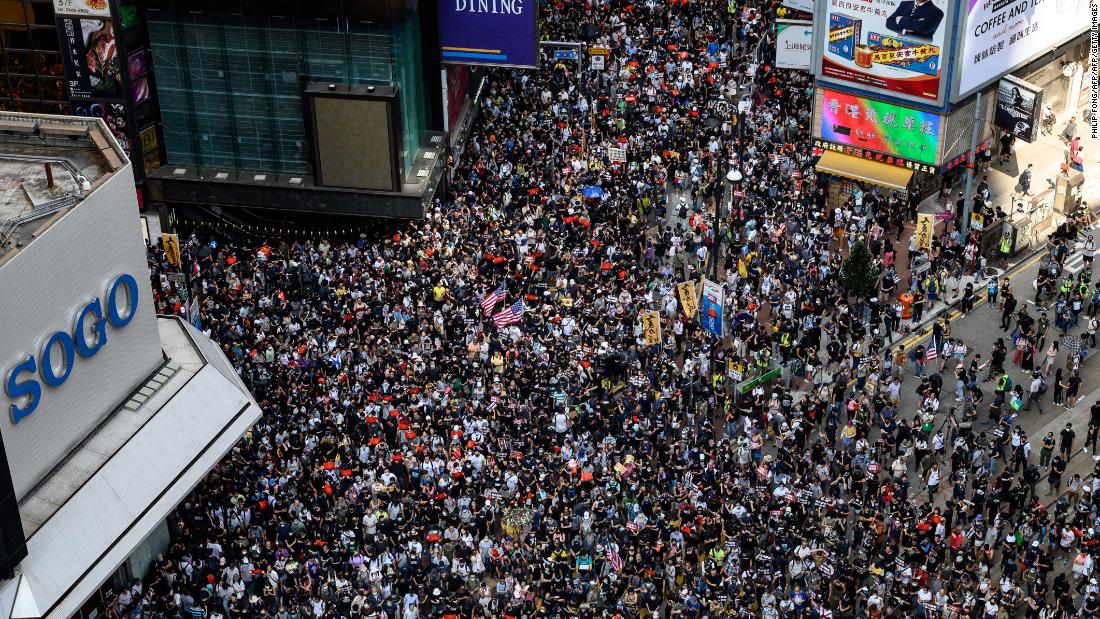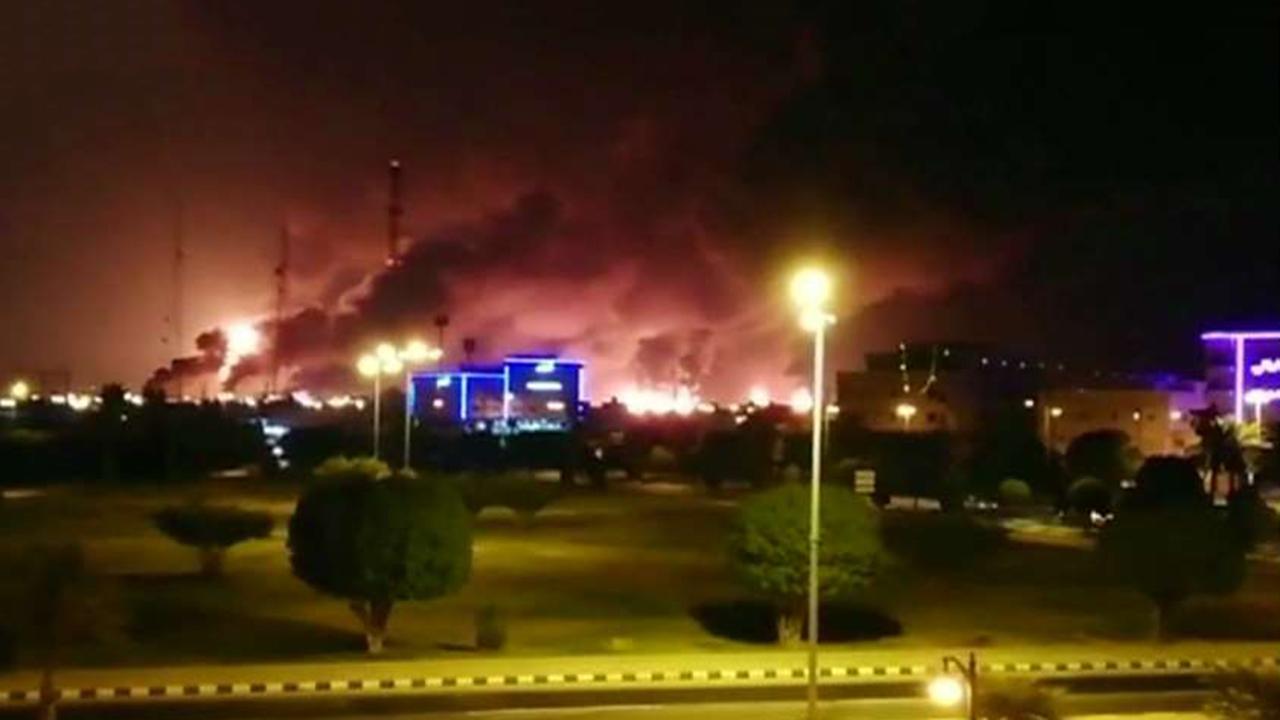Oil prices spiked shortly after trading began Monday after an attack on Saudi Arabia's oil facilities Saturday that knocked out more than five percent of global oil supply and halted output of more than half of Saudi Arabia's daily exports.
Brent crude futures jumped to nearly 20 percent, the biggest intraday percentage gain since the Gulf War in 1991, to a session high of $71.95 a barrel at the opening, while U.S. crude futures surged more than 15 percent to a session high of $63.34 a barrel. Both benchmarks rose to the highest since May.
State oil giant Saudi Aramco said the attack cut output by 5.7 million barrels of crude oil per day. It gave no timeline for output resumption, only saying that work to restore production is underway. It said on Saturday it would provide an update in 48 hours.
As the news of the attacks broke, Secretary of State Mike Pompeo reassured that the United States would work with its partners and allies to make sure that energy markets remain well supplied.
Late Sunday, President Donald Trump also tried to assuage the fears saying he authorized the release of oil from the U.S. Strategic Petroleum Reserve (SPR), if needed, in a quantity to be determined to keep the market well-supplied in the aftermath of the attacks.
U.S. Energy Secretary Rick Perry also said on Monday oil market is resilient and will react positively to the attack on Saudi Arabia's oil industry.
But the attacks have added to anxiety about the stability of the world's oil reserves.
Bloomberg reported Monday that the disruption caused by Saturday's attacks surpasses the loss of Kuwaiti and Iraqi petroleum output in August 1990, when Saddam Hussein invaded his neighbor. It said it also exceeds the loss of Iranian oil production as a result of 1979 during the Islamic Revolution.
"Saudi Arabia has been a very reliable supplier of oil in the world," Jim Burkhard, who heads crude oil research for IHS Markit, told the Associated Press. This attack is "adding a geopolitical premium back into the price of oil,” he said, meaning prices would rise because of worries about more unrest and possible future attacks jeopardizing global oil supplies.
On Saturday, Yemen's Iran-backed Houthi rebels took responsibility for the attacks on Saudi oil infrastructure, saying their drones struck Saudi oil-processing facilities at Abqaiq and Khurais.
However, the U.S. pointed the finger at Iran, another major oil producer and geopolitical player, with Pompeo saying there was “no evidence the attacks came from Yemen.” Iran has denied any responsibility.
While there has been no immediate threat of a military response from Saudi Arabia or the U.S., the uncertainty around any possible retaliation is roiling the markets.
President Trump on Sunday that the U.S. is “locked and loaded” once it’s clear who is behind the attacks.
Experts agree that the long-term effect on oil prices will depend on how fast Saudi Arabia restores production.
"The surge in prices is the natural knee jerk reaction, but the path ahead and ability to sustain at elevated levels remains dependent on the duration of the outage," Michael Tran, managing director of energy strategy at RBC Capital Markets in New York, told Reuters.
Goldman Sachs senior commodity strategist Damien Courvalin told oilprice.com he expects Brent oil prices to rally above $75 a barrel should the current outage last for more than six weeks, a level at which he believes a Strategic Petroleum Reserve release would likely be implemented, large enough to balance such a deficit for several months and cap prices at such levels.
An attack on Saudi Arabia is more important than anywhere else because the rest of the world’s ability to make up for any disruption is limited and they are the largest exporter of crude globally, said Bernadette Johnson with energy analytics company Enverus in an emailed comment to NBC News.
Johnson said the vulnerability of Saudi Arabia oil production to such an attack was “surprising” and the size of disruption is “huge compared to other supply outages we’ve seen,” but the real question is how long it will last.
“If they are able to bring the production back online by Monday, the world crude stocks overhang can easily absorb the loss and price may only jump for a couple days,” Johnson said. “If the supply is out much longer than Monday, we should expect to see a big jump in price until the fields return.”
When it comes to stocks of crude oil however, Johnson said as recently as Thursday, the International Energy Agency (IEA) was warning about the likelihood of continued stock builds (as a result of global oversupply) above the already high levels.
“The world has reserves that could easily handle weeks or a few months of outages from Saudi Arabia,” she said.
In response to the attacks on Saturday, IEA said they were in contact with the Saudi authorities as well as major producer and consumer nations, but reassured that markets were well supplied with “ample commercial stocks.”
Still, Johnson said the attacks were a “double blow” — not was a significant supply of oil lost, but it happened in Saudi Arabia, where the world would normally look for spare capacity to fill the gap.
Reuters and Associated Press contributed.
https://www.nbcnews.com/news/world/oil-prices-spike-after-attack-saudi-facilities-hits-global-supply-n1054691
2019-09-16 10:45:00Z
52780382632806

